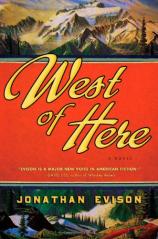Reading Group Guide
Discussion Questions
West of Here

1. Why do you think the author chose to tell the story of Port Bonita from so many different perspectives, rather than use just one omniscient narrator? Do you like this approach? Why or why not?
2. What did you like or not like about the author’s use of a nonlinear approach in telling the story, of shifting the story between two time lines? Did you prefer reading about one era over the other? Why do you think Evison chose to tell the story in this manner?
3. In the midst of the narrative, Thomas and Curtis, the two young Native American characters, seem to change personas, shifting fromone century to another and then back again. What do you see as the significance of having these characters briefly inhabit each other? What do you think the author is trying to say about our accepted notions of history?
4. Why do you think the author decided to mix fact with fiction regarding the history of the Olympic Peninsula --- renaming some places but not others, for instance? Did this approach make you want to research which elements were fact and which fiction?
5. Some of the characters from respective eras seem to have obvious parallels --- for example, Ethan and Jared Thornburgh and Dalton and Dave Krigstadt. Discuss some of the less obvious parallels between characters, and also discuss parallels between events and relationships.
6. With which character did you most closely identify? And with whom would you most like to hoist a Kiltlifter or two?
7. What do you think of Krig’s decision to leave Port Bonita? Beyond the personal significance for Krig, do you sense a larger significance to his departure? How might the story be different if he stayed?
8. Do you truly believe people can change, learn from their mistakes, take new directions? Do you believe people are trapped by their own history, destined to make the same mistakes over and over again? Or do you believe, as Franklin Bell believes, that people are essentially an amalgam of their experiences, incorporating both the good and the bad, following the curve of life rather than pursuing a whole new path?
9. Do you believe that individuals can change the course of history, despite all the trappings, obstacles, institutions, and opposition put in place to prevent that? Or do you think that most individuals are marginalized by the political process or economic limitations or both? Or is history just a big puppet show whose choreography is beyond the reach of people like Rita and Jared or Ethan and Eva?
10. We tend to think of history in terms of big, sweeping events, but in West of Here, the history of Port Bonita, and of the settling of the Pacific Northwest generally, is shown through a series of small happenings, as though we are looking at events through a kaleidoscope that constantly shifts our perspective and shows us the many sides of daily life. Do you feel that this approach works to make the novel more or less dramatic than it might have been had Evison focused on just the big moments? How does it influence your understanding of what life might really have been like for western settlers?
11. In the novel, the settlers of Port Bonita arrive there with personal goals; some want to make money, some want to create the future, but they all have dreams of what is to come. In what respects do you feel the settlers succeed in creating a future for their descendants, and in what ways do they fail? Apply this same perspective to your own hometown and assess how successful its founders were in creating a place for future growth and the personal happiness of the town’s citizens.
12. Ethan Thornburgh is convinced that the damming of the Elwha River is the key to creating the best future for Port Bonita and its citizens, yet by the end of the novel the dam is choking the town’s economy, and it’s about to be torn down. What parallels do you see between the mistakes made by Thornburgh and his generation and the decisions being made in today’s world, as politicians and administrators try to shape the future of America and the world in general?
West of Here
- Publication Date: February 15, 2011
- Genres: Fiction
- Hardcover: 496 pages
- Publisher: Algonquin Books
- ISBN-10: 1565129520
- ISBN-13: 9781565129528








